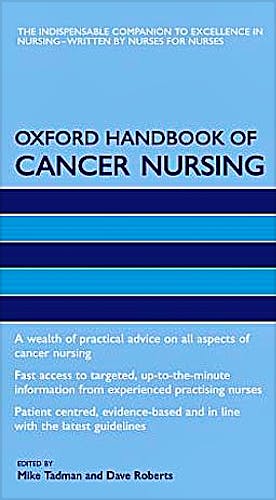

No hay productos en el carrito



Oxford Handbook of Cancer Nursing
Tadman, M. — Roberts, D.
1ª Edición Marzo 2007
Inglés
Tapa blanda
728 pags
1000 gr
null x null x null cm
ISBN 9780198569244
Editorial OXFORD UNIVERSITY PRESS
LIBRO IMPRESO
-5%
29,36 €27,89 €IVA incluido
28,23 €26,82 €IVA no incluido
Recíbelo en un plazo de
2 - 3 semanas
- Fast access to concise, targeted information on all essential aspects of cancer nursing
- Written by experienced nurses and packed full of up-to-the minute guidance and information
- Patient centred, evidence-based and in line with government guidelines
- An indispensable companion for practising and student nurses in a variety of care settings
The Oxford Handbook of Cancer Nursing provides a systematic account of the main areas of cancer nursing practice. Covering all aspects of cancer care, it takes the reader from pre-diagnosis through treatment to issues of advanced disease and palliative care. It includes information on cancer biology, cancer genetics and cancer treatments, as well as material on new targeted therapies and complementary therapies. The symptom management section includes detailed guidelines on nursing assessment and psychosocial issues, communication, the experience of cancer, and family and carer issues.
So you can find the information you need without delay, the book is clearly laid out with one topic per page, and written in an easily readable note-based style. Blank pages for writing notes, observations and local protocols allow your handbook to be customised to meet your specific needs. All this is available at your fingertips, in a pocket-sized handbook with hard-wearing plastic covers.
Written by practising nurses and subject experts, the Oxford Handbook of Cancer Nursing is a unique and invaluable companion to practising and student nurses, and to all health care professionals involved in the care of patients with cancer.
Readership: All nurses involved in the care of patients with cancer, particularly practising specialist cancer and palliative care nurses, district nurses, and specialist nurse practioners as well as those in training.
Contents
Section One: Introduction
Section Two: The cancer problem
2: Cancer epidemiology
3: Cancer biology
4: Cancer prevention and screening
Section Three: The experience of cancer
5: The personal experience of cancer
6: The social experience of cancer
Section Four: Supportive and palliative care
7: Supportive care
8: Information and user involvement
9: Psychological, social and spiritual support
10: Rehabilitation of the cancer patient
11: Complementary therapies
12: Palliative care
13: Ethics in cancer care
Section Five: Clinical management of cancer
14: Diagnosis and staging
15: Surgery and cancer
16: Radiotherapy
17: Chemotherapy
18: Hormonal therapy
19: Biological therapy
20: High does therapy (autologus transplant)
21: Allogeneic haemopoietic stem cell transplantation
22: Clinical trials
Section Six: Management of major cancers
23: Bone cancer
24: Breast cancer
25: Central nervous system cancer
26: Colorectal cancer
27: Cancer of unknown primary (CUP)
28: Endocrine cancers
29: Upper gastrointestinal cancers
30: Genitourinary cancers
31: Gynaecological cancers
32: Haematological cancers
33: Head and neck cancers
34: HIV-related cancer
35: Lung cancer
36: Skin cancer
Section Seven: Symptom management
37: Assessment
38: Bone marrow suppression
39: Blood product support
40: Thrombosis
41: Altered bowel function
42: Cancer-related breathlessness
43: Cancer-related fatigue
44: Malignant effusions
45: Nausea and vomiting
46: Nutritional disorders
47: Pain management
48: Symptom management at the end of life
49: Psychological reactions to cancer
50: Other psychological problems encountered in people with cancer
51: Altered body image
52: Sexual health and cancer
53: Skin and mucosal alterations
Section Eight: Oncological emergencies
54: Oncological emergencies
© 2025 Axón Librería S.L.
2.149.0